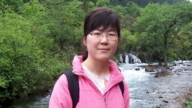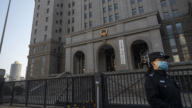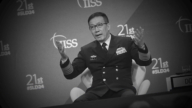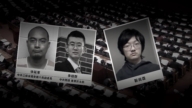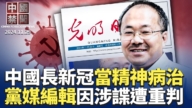【新唐人2013年02月04日訊】大陸國務院總理溫家寶曾經多次在不同場合提到政治體制改革,但每次都難有下文。最近,即將卸任的溫家寶在國務院會議上再次談及政改,但大約10天之後,官媒才予以報導。這被外界視為中共對政改話題刻意淡化,體制內改革派力量越發處於弱勢,而大陸民眾也已經對病入膏肓的中共徹底絕望。
最新一期的中共中央核心刊物《求是》雜誌,刊登了大陸國務院總理溫家寶1月23號在國務院第八次全體會議上的講話,但做了刪節。
在講話中,溫家寶對近10年的國務院工作進行了總結,並且比較隱晦的再次提到政改。他談到:提高治國理政能力,實現國家長治久安,是任何時代、任何國家的執政者都必須思考和解決好的重大課題。治理國家必須依靠民主和法治,歸根結底就是必須有一套完善的體制、機制和制度。
溫家寶說,權力過分集中又沒有制約,是滋生腐敗的根源。而「推進政府機構改革」是政治體制改革的重要內容。
溫家寶這一涉及政改的講話,在延遲大約10天後才被官媒報導。
旅美中國問題觀察人士張健:「就是強烈的用這種方式來告訴體制內的人,溫家寶講話已經不算數了,他所講的只代表他個人的想法、他的思路。也只代表他即將離任之前講的一些官話、客套話。」
原《河北人民廣播電臺》編輯朱欣欣也認為,溫家寶即將卸任,在黨內的影響力越來越弱。當局登出這個涉及政改的講話,只不過是用來安撫民心、裝點門面而已。
原河北人民廣播電臺編輯朱欣欣:「(從)整個中共這個體制、上上下下官員們的表現來看,中共改革力量越來越弱。可以說,大部分民眾、包括要求自由民主的知識份子,對中共失去了耐心和信心。」
在此之前,中共現任總書記習近平在接任中共最高領導人之後,也曾倣傚鄧小平到廣東南巡,做出改革者姿態,並誓言大力反腐,要打「大老虎」,一時引來外界關注。
朱欣欣:「整個這個體制都變成一個腐敗貪污的體制了,已經完全失去了自我的更新能力,完全是病入膏肓。習近平上臺後實行的措施也是治標不治本。」
朱欣欣指出,如果習近平要治本,就必須徹底改革,這就會觸動中共特權階層,導致中共內部分裂。而如果不改革,外部的巨大民怨隨時會引爆中國社會。
朱欣欣:「有句老話經常說:不改革亡國,改革亡黨。我看國家永遠亡不了,只能是共產黨(亡)。它現在改也好,不改也好,早晚也是個亡。」
旅美中國問題觀察人士張健也認為,中共高層不可能真正反腐,只是做樣子給老百姓看。
張健:「從下到上,這個根已經全爛了,從根子上爛掉了。這個體制已經垮掉了。維持這個體制靠的就是國家機器、專政、一言堂,它依靠的就是這些東西。它怎麼可能在這個節骨眼上,把中國所有的官員全部都抓掉呢。」
評論指出,雖然溫家寶屢次高呼政改已被其他中共高層人士所默許,但是他們仍然會在事後採取相應辦法減小溫家寶講話的影響。張健表示,當年溫家寶繼任國務院總理的時候,人們也曾經對所謂「胡溫新政」充滿期待。但這10年的社會現實是,貪官越來越多、集權越來越厲害、人民被盤剝的更加嚴重。
另據報導,2月1號上午,溫家寶來到北京市西城區牛街西裡二區走訪,並召開座談會。會上溫家寶表白:自己工作做得不夠好,感到愧疚自責,希望得到老百姓的原諒。
採訪/劉惠 編輯/李謙 後製/周天
Wen Jiabao’s One More Political Reform Downplayed by the Party
Chinese Premier Wen Jiabao has repeatedly advocated
political reform, but then followed up with nothing.
Recently at a session of the State Council,
Wen once again spoke of political reform.
The official media didn’t publish the speech until 10 days later.
The action was seen as the Chinese Communists Party
deliberately down-playing political reform.
Observers think the CCP reformist forces have waned, while
the public in China have totally lost their confidence in the CCP.
The latest issue of Qiu Shi, CCP official magazine,
published Wen Jiabao’s speech given on January 23, the speech was shortened.
At the 8th State Council plenary, Wen Jiabao summarized
the State Council’s work over the past 10 years.
Again, Wen spoke indirectly of political reform.
He said that improving governance capability to realize
long-term state stability is a major task that
any ruler in any country and at any time
should ponder over and solve.
He stated that governance must rely on democracy and
rule of law, that is, a full-fledged system, mechanism and institutions.
Wen said that excessive and unchecked concentration
of political power is the root of corruption.
And so, “promoting reform of government agencies” is
an important part of political system reform.
Wen’s speech didn’t appear on the CCP’s official media
until 10 days later.
(Political observer) Zhang Jian: “In this way, it intentionally
told the CCP ruling elite that Wen Jiabao’s talk no longer works.
And that Wen’s speech is only his personal views and
some words of courtesy before he leaves office."
Zhu Xinxin, editor of former Hebei state radio, remarks that
the outgoing Wen Jiabao’s influence within the CCP has weakened.
The authorities used this speech as a window dressing
to appease the population, he says.
Zhu Xinxin: “The performance of the entire CCP system and
its officials show that the CCP’s energy for reform is waning.
At the moment, most of the populace, including pro-democracy
intellectuals, have lost patience and confidence in the CCP."
Prior to that, CCP new leader Xi Jinping did a southern tour
in Guangdong, the same trip taken by Deng Xiaoping in 1992.
Xi made a gesture of reform and vowed to assertively
fight against corrupt bigwigs, which drew the world’s attention.
Zhu Xinxin: “The entire CCP system is totally corrupt,
it has completely lost it’s self-renewal capacity. Xi’s initiatives are only palliatives.”
Zhu Xinxin indicates that a real cure is only achieved by
implementing a thorough reform.
But that will affect the CCP’s privileged elite,
and trigger the split up of the CCP.
And if it doesn’t carry out the reform, huge grievances
among the populace can explode at any time, Zhu Xinxin remarks.
Zhu Xinxin: “There’s an old saying: If it carries out the reform,
the CCP will perish; but if not, China itself will perish.
I believe the nation won’t die but the CCP will.
So regardless of what it’s dong now,
reform or no reform, it will end up dead.”
Zhang Jian says that the CCP top leadership won’t truly
combat corruption. It’s just a pose shown to the public.
Zhang Jian: “From bottom to top,
the CCP system has been rotten to the core.
Now the system is maintained by the operation of
state apparatus, and stifling free speech.
Clearly it cannot arrest all of its officials
at this moment “
Media commented that Wen Jiabao’s repeated political
reform proposals were acquiesced by other CCP top leaders.
But in various ways afterwards, they would still
lessen the impact of Wen’s talks.
Zhang Jian says that when Wen Jiabao became premier,
the public saw “the Hu-Wen administration” as a new hope.
Yet ten years later, China sees more corrupt officials,
more concentration of power, and more serious exploitation of the masses.
On February 1st, Wen Jiabao reportedly paid a visit to
a community in Xicheng district, Beijing and held a seminar.
At the seminar, Wen said he didn’t do a good job and felt guilty
about that. He was hoping to get the forgiveness of the masses.



